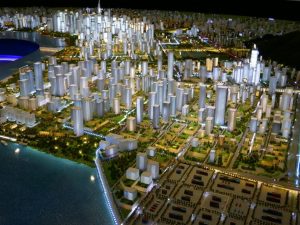Program on Chinese Cities Considers Urban Development at UNC-Chapel Hill and Beyond
April 1, 2019UNC Global Affairs
As director of the Program on Chinese Cities, an initiative within the University of North Carolina at Chapel Hill’s Department of City and Regional Planning to study urbanization in China, Yan Song has seen how the evolution of networks has impacted city design as well as the natural environment. Song’s work with smart and sustainable cities and land development and management have helped her understand the importance of networks on physical, social, societal and developmental levels. Song founded the program in 2008 to provide Chinese scholars the opportunity to observe and study these kinds of networks at UNC-Chapel Hill.
“Half the [Chinese] population is living in cities now,” she says. “That number is projected to grow to 70 percent in the next 20 years.”
Many things happen behind the scenes of urbanization. City development struggles to meet the needs of the people, not simply in terms of population growth, but with regard to resources and health. The program’s mission is to document these phenomena through research and observation, analyze the data with respect to current issues and policies and use its findings to influence urban development policies and practices in China.
Song expresses concerns about the global implications of China’s rapid metropolitan development, which led her to expand the program. Over the course of 10 years, the program’s urban planning research has grown to encompass other disciplines including environmental science, regional science, urban economics, transportation and ecological planning.
Through the program, scholars come to Carolina for one year, during which they research aspects of local development in relation to their fields of study. Development is a process and phenomenon that needs to be evaluated on multiple levels, and especially in regard to equality. In the face of climate change, Song emphasizes that urban development and policies need to respond to environmental stresses, not worsen them. The program has increasingly emphasized sustainability, encouraging scholars to use a 3E approach of analyzing Equity, Economy and Environment in an interdisciplinary context.
The program’s mission and 3E approach echo the sentiments of the 11th goal in the United Nations’ Sustainable Development Goals: Make cities inclusive, safe, resilient and sustainable. This means employing measures to include marginalized and underserved communities in decision-making, ensure the overall welfare of the people, design cities to better withstand crises and protect the environment from further degradation.
“We talk about not only just building strategies but also talk about planning [and] the bigger scale,” she says.
As the rapid growth of Chinese cities continues, it is increasingly important for scholars to observe, analyze and research the associations between the urban form and issues like pollution. By comparing knowledge of their cities with the development that has occurred on Carolina’s campus and in the wider North Carolina area, scholars can improve policy recommendations in China.
Song explains that urbanization is not limited to the construction and restructuring of cities—it also concerns shifts in populations, residency and society. For example, the government seizing farmland to repurpose for urban development displaces farmers and their families; measures should be taken to reintegrate displaced peoples into society, through education and work, as well as programs to support their health through the transition.
Urban Sprawl Affects the Livelihoods of Peoples and Nature Alike
Tongyu Li and Binxia Xue of the Harbin Institute of Technology came to Carolina in spring 2017 to study urbanization, landscape architecture and horticulture therapy, a form of healing that engages individuals with gardens and other natural environments. Participation in activities that involve nature or take place in natural spaces has been shown to alleviate mental and physical ailments.
“We came here to study resilient cities and city planning, to make the city structure more adaptive to the natural environment, to population growth and economic growth,” says Xue.

Li and Xue toured the Carolina campus many times, in addition to attending classes at other universities in North Carolina. Taking note of landscape, design styles and the variety of architectural structures, they hope to improve the trend of urban development within China, paying special attention to the mental health effects of urbanization.
“I think that most people are under pressure,” Xue says. “In China, we have very serious environment and pollution problems. Tuition fees for children are very high, and housing fees are very high.”
Song connected Li and Xue to the American Horticulture Therapy Association and directed them to a mental health treatment research program in Atlanta, where they were able to observe horticulture therapy in practice, interact with clients and learn about their activities and interactions with nature.
Li and Xue emphasize that their experiences with the Program on Chinese Cities gave them new insights into horticulture therapy and landscape design, and they are excited to use their findings to conduct more research and improve urbanization policies in China.
Song hopes that all Program on Chinese Cities scholars leave Carolina with, as she says, ideas for “how to better guide cities to grow.”
This story originally appeared in the 2019 issue of Carolina Passport magazine.
